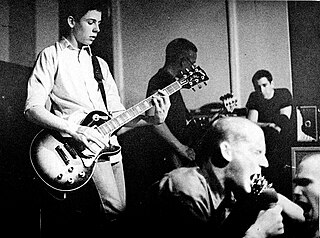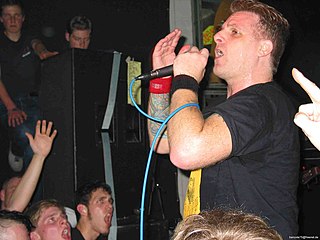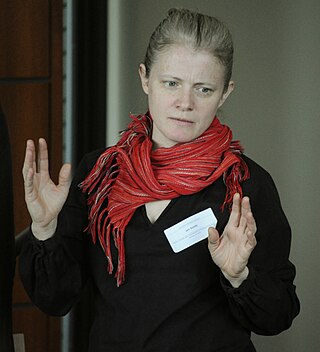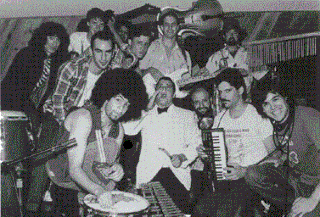Related Research Articles

Minor Threat was an American hardcore punk band, formed in 1980 in Washington, D.C., by vocalist Ian MacKaye and drummer Jeff Nelson. MacKaye and Nelson had played in several other bands together, and recruited bassist Brian Baker and guitarist Lyle Preslar to form Minor Threat. They added a fifth member, Steve Hansgen, in 1982, playing bass, while Baker switched to second guitar.

Bikini Kill is an American punk rock band formed in Olympia, Washington, in October 1990. The group originally consisted of singer and songwriter Kathleen Hanna, guitarist Billy Karren, bassist Kathi Wilcox, and drummer Tobi Vail. The band pioneered the riot grrrl movement, with feminist lyrics and fiery performances. Their music is characteristically abrasive and hardcore-influenced. After two full-length albums, several EPs and two compilations, they disbanded in 1997. The band reunited for tours in 2019 and 2022, with Erica Dawn Lyle on guitar in place of Karren.

Bratmobile is an American punk band from Olympia, Washington, formed in 1991. They are known for being one of the first-generation "riot grrrl" bands. The band was influenced by several eclectic musical styles, including elements of pop, surf, and garage rock.

The U.S. state of Washington has been home to many popular musicians and several major hotbeds of musical innovation throughout its history. The largest city in the state, Seattle, is known for being the birthplace of grunge as well as a major contributor to the evolution of punk rock, indie music, folk, and hip hop. Nearby Tacoma and Olympia have also been centers of influence on popular music.
Digital hardcore is a fusion genre that combines hardcore punk with electronic dance music genres such as breakbeat, techno, and drum and bass while also drawing on heavy metal and noise music. It typically features fast tempos and aggressive sound samples. The style was pioneered by Alec Empire of the German band Atari Teenage Riot during the early 1990s, and often has sociological or far-left lyrical themes.

K Records is an independent record label in Olympia, Washington founded in 1982. Artists on the label included early releases by Beck, Modest Mouse and Built to Spill. The record label has been called "key to the development of independent music" since the 1980s.

7 Seconds are an American hardcore punk band from Reno, Nevada, that was formed in 1980 by two sets of brothers. The band has gone through numerous lineup changes over the subsequent years, with only Kevin Seconds and Steve Youth remaining constant members.

Government Issue was an American hardcore punk band from Washington, D.C. active from 1980 to 1989. The band experienced many changes in membership during its nine-year existence, with singer John Stabb as the only consistent member in an ever-fluctuating lineup that at various times included notable musicians Brian Baker, Mike Fellows, Steve Hansgen, J. Robbins, and Peter Moffett. Government Issue originated from the Washington, D.C. hardcore scene but added elements of heavy metal, new wave, and psychedelic rock on later records. Though this has caused the band to be sometimes overlooked in relation to other Washington, D.C. hardcore acts, their stylistic diversity made them influential to later punk rock groups. Government Issue performed occasional reunion shows in the 2000s and 2010s with various lineups, until Stabb's death from stomach cancer in 2016.

Bad Brains is the debut studio album recorded by American hardcore punk/reggae band Bad Brains. Recorded in 1981 and released on the cassette-only label ROIR on February 5, 1982, many fans refer to it as "The Yellow Tape" because of its yellow packaging, much in the way that the Beatles' self-titled record is often called "The White Album". Though Bad Brains had recorded the 16 song Black Dots album in 1979 and the 5-song Omega Sessions EP in 1980, the ROIR cassette was the band's first release of anything longer than a single.

Void was an American hardcore punk band formed in Columbia, Maryland, in 1980. The group was a pioneering force in the thriving Washington, D.C., hardcore scene during the early 1980s, successfully combining elements of punk with heavy metal in a style that was accepted by the scene's otherwise exclusive community. Void's punk metal fusion sound was marked by guitarist Bubba Dupree's innovative guitar work and the "unhinged" vocals of John Weiffenbach, which resonated in the band's chaotic but popular live performances. Like many of their contemporaries, Void had a short-lived recording career, limited to the split album Faith/Void Split with the Faith on Dischord Records. However, they have enjoyed an enduring cult following among hardcore aficionados.
Christina Billotte is an American singer, songwriter, and guitarist, known for her involvement in the punk music scene in Washington, D.C., as a performer and organizer. She is included in Venus Zine's list "The Greatest Female Guitarists of All Time".
Sharon Ann Cheslow is an American musician, composer, artist, writer, photographer, educator, and archivist. In 1981, she formed Chalk Circle, Washington, D.C.'s first all-female punk band. She has since become an accomplished artist who works between different mediums, mostly sound-based.
Emily's Sassy Lime was an American punk rock group from Southern California. The group was formed in 1993 by three Asian American teenagers: sisters Wendy Yao and Amy Yao, and their friend Emily Ryan.
Bloody Mannequin Orchestra were an influential early 1980s punk band from Bethesda, MD. They formed around a small, but active, scene at Bethesda-Chevy Chase High School and were part of the larger D.C hardcore community. The band members were Colin Sears, Roger Marbury, Alex Mahoney, Sharon Cheslow and Charles Bennington.

Jen Smith is an artist, musician, zine editor, and activist from the United States. Smith is credited with being the inspiration behind the term riot grrrl and being one of the architects of the movement.
Riot grrrl is an underground feminist punk movement that began during the early 1990s within the United States in Olympia, Washington and the greater Pacific Northwest and has expanded to at least 26 other countries. Riot grrrl is a subcultural movement that combines feminism, punk music, and politics. It is often associated with third-wave feminism, which is sometimes seen as having grown out of the riot grrrl movement and has recently been seen in fourth-wave feminist punk music that rose in the 2010s. The genre has also been described as coming out of indie rock, with the punk scene serving as an inspiration for a movement in which women could express anger, rage, and frustration, emotions considered socially acceptable for male songwriters but less common for women.
The High Back Chairs was a band from Washington, DC. Initially consisting of guitarist/vocalist Peter Hayes, guitarist Jim Spellman, bassist/vocalist Charles Steck, and drummer/vocalist Jeff Nelson, the group released its music on the Washington, D.C. punk record label, Dischord Records. The band eschewed the post-hardcore and hardcore punk sounds that Dischord was known for. Instead, the High-Back Chairs' music was highly melodic indie rock, owing more to power pop and jangle pop than to the band's punk rock roots. This was all the more notable since Nelson was a co-founder of Dischord and had played in the influential hardcore punk band, Minor Threat from 1980 to 1983. "Coming out at a time when grunge held a lot of sway in Amerindie land," Trouser Press later said of the band, "this breezy, supremely melodic, gutsy rock seemed almost noble."
JFA is an American hardcore punk band formed in 1981, with roots in Arizona and in Southern California skateboard culture. The original members include Brian Brannon (vocals), Don "Redondo" Pendleton (guitar), Michael Cornelius (bass), and Mike "Bam-Bam" Sversvold (drums). Alan Bishop of Sun City Girls also played bass for a time. The band was pivotal in the development of the skate punk and Skate Rock scenes. Over the years, the lineup has included many bass players and drummers but the core of Brannon and Redondo has remained constant.

No Trend was an American noise rock and hardcore punk group from Ashton, Maryland, formed in 1982. They were considered anti-hardcore, with the members, especially guitarist and lyricist Frank Price, vehement about their abhorrence towards the punk youth subculture. The band was known for their confrontational stage performances, which normally involved aggressively baiting their punk audience. They were influenced by Public Image Ltd. and Flipper.
Suture was an American punk rock and indie rock trio based in Washington, D.C., affiliated with early riot grrrl. Suture consisted of Kathleen Hanna, Sharon Cheslow, and Dug E. Bird aka Doug Birdzell.
References
- 1 2 3 Andersen, Mark; Jenkins, Mark (2001). Dance of Days: Two Decades of Punk in the Nation's Capitol. Akashic Books. ISBN 978-1-933354-99-6.
- 1 2 Azerrad, Michael (2001). Our Band Could Be Your Life: Scenes from the American Indie Underground, 1981-1991 . Little, Brown and Company. ISBN 0-316-78753-1.
- 1 2 3 4 Breihan, Tom (February 2011). "No Age's Spunt Reissues D.C. Punks Chalk Circle". Pitchfork .
- 1 2 3 4 5 6 Hopper, Jessica (April 2011). "Early D.C. girl punks Chalk Circle make a posthumous debut". Chicago Reader .
- ↑ Connolly, Cynthia; Clague, Leslie; Cheslow, Sharon (1988). Banned in DC: Photos and Anecdotes From the DC Punk Underground (79-85) . Sun Dog Propaganda. ISBN 0-9620944-0-4.
- 1 2 3 4 5 6 7 8 9 10 11 12 13 14 Fleming, Don (2010). Chalk Circle "Reflection" liner notes. Mississippi/Post Present Medium.
- 1 2 3 4 5 6 7 8 Malitz, David (May 2011). "Revisiting Chalk Circle, D.C.'s first all-female punk band". The Washington Post .
- 1 2 3 4 5 6 7 8 9 10 Gibbon, Layla (August 2008). "Sharon Cheslow interview". Chimps/MRR.
- 1 2 3 4 Douglas, Martin (June 2011). "Chalk Circle: Reflection album review". Pitchfork .
- ↑ Lowndes, Sarah (2006). The DIY Movement in Art, Music and Publishing: Subjugated Knowledges. Taylor & Francis. ISBN 978-1317555650.
- 1 2 Hornreich, Dina (October 2008). "Sharon Cheslow interview". Perfect Sound Forever .
- 1 2 Guinness, Alex (1982). "Chalk Circle interview" . Retrieved 31 October 2021.
- ↑ Nguyen, Mimi Thi (July–November 2012). "Making Waves: Other Punk Feminisms". Women & Performance: A Journal of Feminist Theory. Routledge. 22 (2–3): 355–359. doi:10.1080/0740770X.2012.720895. S2CID 194103788 . Retrieved 23 October 2021.
- 1 2 3 4 Barton, Laura (March 4, 2009). "Grrrl power". The Guardian .
- ↑ Klein, Melissa (1997). "Duality and Redefinition: Young Feminism and the Alternative Music Community". In Heywood, Leslie; Drake, Jennifer (eds.). Third Wave Agenda . Minneapolis, MN: University of Minnesota Press. ISBN 978-0-8166-3005-9.
- ↑ Hannon, Sharon M. (November 2, 2017). "Punk Rock Was Not A Boys' Club". Please Kill Me.
- 1 2 3 4 Marcus, Sara (2010). Girls To The Front: The True Story of the Riot Grrrl Revolution. Harper Perennial. ISBN 978-0-06-180636-0.
- ↑ Meltzer, Marisa (2010). Girl Power: The Nineties Revolution in Music. Faber and Faber. ISBN 978-0-86547-979-1.
- ↑ Bale, Jeff (July 1983). "Mixed Nuts Don't Crack LP". Maximum Rocknroll .
- ↑ Monem, Nadine, ed. (2007). Riot Grrrl: Revolution Girl Style Now!. Black Dog Publishing. ISBN 978-1906155018.
- ↑ Chavez, Mea (March 1, 2009). "Arizona designer's happy feet". Curve .
- ↑ Williams, Stephanie (December 12, 2018). "Shout it hard: The fearless women who ruled D.C.'s punk scene in the '80s". The Washington Post .
- ↑ Fulton, Len (October 1989). The International Directory of Little Magazines and Small Presses, 1989–90. Dustbooks. ISBN 9780916685096.